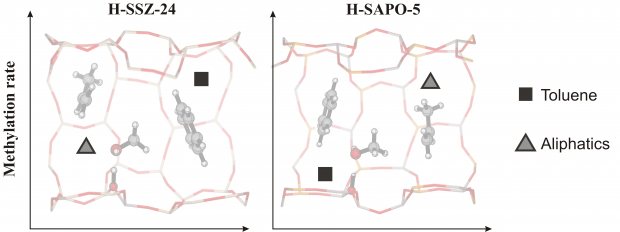How zeolitic acid strength and composition alter the reactivity of alkenes and aromatics towards methanol

Abstract
This work encompasses a combined experimental and theoretical assessment of how zeolitic acid strength and composition affects acid-catalysed methylation reactions. Overall, higher methylation rates were observed over the material with higher acid strength. Co-reactions of methanol with benzene at 250 degrees C over the two isostructural AFI materials H-SSZ-24 and H-SAPO-5 revealed large differences in selectivity. While the stronger acidic H-SSZ-24 mainly produced toluene and polymethylbenzenes, high yields of C4+ aliphatics were observed over H-SAPO-5. These results strongly suggest that alkene methylation was preferred over H-SAPO-5 even at very low conversion during methanol/benzene co-reactions. Furthermore, a comparison of benzene and propene methylation at 350-400 degrees C revealed a significantly faster rate of benzene than propene methylation in H-SSZ-24, whereas the rates of benzene and propene methylation were similar in H-SAPO-5. The observed difference in reactivity of the two hydrocarbons in both catalysts could be understood by careful analysis of various molecular dynamics simulations of the co-adsorbed complexes. The probability to form protonated methanol was, as expected, higher in the more acidic material. However, in H-SSZ-24, the probability for methanol protonation was higher when co-adsorbed with benzene than when co-adsorbed with propene, while the same was not observed in H-SAPO-5. Furthermore, it was found that benzene and methanol are more likely to form a reactive co-adsorbed complex in H-SSZ-24 compared to propene and methanol, while the opposite was observed for H-SAPO-5. This work shows that molecular dynamics simulations provide insights into the adsorption behaviour of guest molecules in large pore AFI materials. The obtained insights correlate with the experimentally observed reactivities. (C) 2015 Elsevier Inc. All rights reserved.
 Open Access version available at UGent repository
Open Access version available at UGent repository